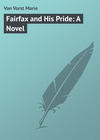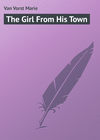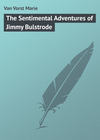Kitabı oku: «Fairfax and His Pride: A Novel», sayfa 24
CHAPTER III
On the promenade deck of one of the big steamers, as it pushed around into its pier, a man stood in his long overcoat, his hands in his pockets, hoping to avoid the reporters whom he had reason to suppose were ready to make him their prey.
He was entering New York Harbour at an early hour in the morning. It was November, and over the river and over the city hung the golden haze. If the lines of the objects, if the shore and buildings were crude, their impression was not so to him. To and fro the ferries plied from shore to shore, and their whistles and the whistles of the tugs spoke shrilly and loudly to the morning, but there was nothing nasal or blatant to him in the noises. He found the scene, the light of the morning, the greeting of the city as it stirred to life, enchanting. He had gone away from it six years ago, a broken-hearted man, and it seemed now as though he had made his history in an incredibly short time. Down in the hold of the boat, in their cases, reposed his sculptures, some thirty statues and models that he had brought for his exposition in New York. He had come back celebrated. His visions and his dreams so far had been fulfilled.
Once again all his past, all his emotions, his tears and aspirations, culminated in this hour. This was his return, but not as Antony Fairfax. He did not know that he should ever take his old name again. He had made the name of Thomas Rainsford famous, and the fact gave him a singular tender satisfaction, linking him with a dear man who had loved him. He felt almost as though his friend were resurrected or given a new draught of immortal life every time the name was said.
A young man came up to him, pencil in hand, his look eager and appealing, and Fairfax recognized a reporter in search of a good newspaper story. He understood the poor clothes, the dogged determination.
"You want a story?" he said. "Well, sit down."
The newspaper man, highly delighted with the sculptor's sympathy and understanding, wrote his interview with enthusiasm.
Fairfax talked for five minutes, and said at the close, "I had not intended to be interviewed. But you are a rising man; you have secured me against my will."
The reporter put up his pad. "Thank you, Mr. Rainsford; but this is so impersonal. I would like some of your views on art. They tell me you have had a tough fight for success and existence."
"Many of us have that," said Fairfax.
"Your ideals, sir?"
The young chap was only twenty-one. It was his first interview. Fairfax smiled.
"Downstairs in the hold are thirty cases of my work, the labour of the last six years. Go to my exposition, and you will see my ideals."
As the other took his leave Antony saw himself again, poor, unknown, as he had set foot in New York. There was a deputation on the wharf to meet him from the Academy of Design, and he walked down the gang-plank alone, leaving no one behind him in France who stood to him for family, and he would find no one in America who should mean to him hearth and home.
They had taken rooms for him in the old Hotel Plaza overlooking 59th Street; there, toward the afternoon of the first day, he found himself at three o'clock, alone in his parlour overlooking Central Park.
The trees were still in leaf. November was mild and golden. The air of America, of the city which had once been unfriendly to him, and which now opened its doors, blew in upon him through the open window like a caress. He looked musingly at the little park where he had wandered with Gardiner and Bella, on the Sunday holiday, when Bella had told him "all things she wanted to do were wicked."
Amongst his statues he had brought over was one lately bought by France and presented to the Metropolitan Museum. It was the marble of a little girl mourning over a dead blackbird. Everything in the city was connected now with Bella Carew.
There was a sheaf of invitations on the table from well-known New Yorkers, invitations to dinners, invitations to lecture, and he knew that he would be taken into the kindliest heart of New York. Well, if work can give a man what he wants, he had worked enough for it; there was no doubt about that. It had been nearly a year since his interview with Cedersholm. He brought with him casts and statues for the triumphal arch in Boston, and he intended taking a studio here and continuing his work in America, but he had no plans. In spite of his success and the prices he could command, his thoughts and his mind were all at sea. His personality had not yet developed to the point where he was at peace. He knew that such peace could only come to him through the companionship of a woman.
No commonplace woman would satisfy Fairfax now.
Money and position meant absolutely nothing to him. If Bella Carew were a rich and brilliant heiress it would probably alienate him from her. His need called for a woman who could work at his side with a kindred interest, a woman who knew beauty, who loved art, whose appreciation and criticism could not leave him cold.
What would Bella Carew, when he found her – as he should – prove herself to be? Spoiled she was, no doubt, mistress for several years of a large fortune, coquette, flirt; of these things he was partly sure, because she had not married. Children with her great promise develop sometimes into nonentities, but Bella, at sixteen, had surpassed his wildest prophecies for her. Bella, as he had seen her on the outskirts of the crowd, had driven him mad. He knew that it had been she; there was no doubt about it in his mind. Now to find her, to see what she had become.
He knew that Bella, when she opened the morning papers the next day – if she were in New York – would discover who he was. There would be descriptions of him as a lame sculptor; there would be reproductions of his "Open Door"; there would be the fact that he was born in New Orleans; that he assumed the name of Rainsford. Now that he had no longer any secret to keep, his own name, Antony Fairfax, would appear. Bella would not fail to know him.
CHAPTER IV
He took his gloves and his hat and started out. He drove to the address which Bella had given him, where her letters were to be sent. It was a studio building, and the woman stenographer at the general desk knew that Miss Carew was absent in Europe and had not returned.
This was a blow; the woman saw the disappointment on his face.
"Miss Carew's letters?" he asked.
She pointed to the empty box. They were all sent to her to Europe.
He wandered in the little office whilst the woman did her work. He glanced around him. On the walls there were framed sketches; there were busts in plaster on pedestals.
It struck him as strange that Bella should have her letters sent to her to a studio. He wanted to question the secretary, hesitated, then asked —
"You know Miss Carew?"
"Very well."
"I reckon she patronizes this academy."
It would not have been surprising if she had given it some large donation.
The stenographer repeated the word, "Patronizes? Miss Carew works here when she is in America; she has a small studio here."
"Works here? Do you mean she paints?"
The woman smiled. "Yes; she has been studying in Florence. I expect her home every day."
Fairfax still lingered, drawing his soft gloves through his hands.
"There's nothing to do, then, but to wait," – he smiled on her his light smile. He turned to go, hesitated. The temptation was too strong.
"Miss Carew paints portraits?"
"Yes," said the stenographer, "beautiful portraits."
He smiled, biting his lips. He remembered the parallel lines, the reluctant little hand drawing them across the board.
"No more parallel lines, Cousin Antony."
He did not believe that she painted beautiful portraits. He would have loved to see her work, oh, how much! There must be some of it here.
"There is nothing of hers here, I suppose?"
He went across the little room to the door. He could hardly bear to go from here, from the only place that had any knowledge of Bella as far as he knew.
He took out his card, scribbled his address upon it, handed it to the stenographer, without asking anything of her but to let him know when she would come back.
The woman nodded sympathetically.
"It is unusual for a great heiress, like Miss Carew, to paint portraits."
"She is not a great heiress; Mr. Carew lost all his money two years ago. I think Miss Carew is almost quite poor."
A radiant look came over Antony's face. "Thank you very much indeed," he said. "I count on you to take care of this little commission for me," and he went out of the room in ecstasy, closing the door behind him.
CHAPTER V
He left his hansom at the entrance of the park, at 72nd Street.
There, on the corner, stood his uncle's house, a monument, to him, of the past. His heart beat hard as he looked at the unfriendly dwelling from whose doors he had rushed on the night of the winter blizzard, when, as it had seemed to him then, little Gardiner's spirit rushed with him out into the storm. From those windows Bella had waved her hand.
How his spirits had risen high with hope, the night on which he had first gone up those steps. It was on that night Bella had said to him, "Why, you have got a light step and a heavy step, Cousin Antony. I never heard any one walk like that before."
He tramped into Central Park, taking his way to the Metropolitan Museum. At the door he was informed that the museum was closed. He gave his card, and, after a few words with the man in charge, Thomas Rainsford the sculptor was let in and found himself, to all intents and purposes, alone. He wandered about the sculptures, wondering where the statue of little "Bella" would be placed.
The rooms were delightfully restful. He chose a bench and sat down, resting and musing.
In front of one of the early Italian pictures stood an easel with a copy exposed upon it to his view. A reproduction of a sixteenth-century Madonna with a child upon her breast. The copy showed the hand of an adept in colour and drawing. Antony looked at it with keen pleasure, musing upon the beauty of the child.
Afterwards he rose and went into the Egyptian room, lingering there. But when he came back the painter was there before her easel, and Antony stood in the doorway to watch her at work.
She wore a long brown linen painting apron that covered her form, evidently a slender form, evidently a young form. She painted ardently, with confidence and absorption. As Antony watched her, her pose, her ardour, the poise of her body, the lovely dark head, the gestures, the fire of her, brought all of a sudden his past rushing back to him. The sight of her came to him with a thrilling, wonderful remembrance. He came forward, his light step and his heavy step falling on the hard wood floors of the museum.
She turned before he was close to her, her palette and her brushes in her hand. She stood for a moment immovable, then gave a little cry, dropped her palette and brushes on the floor, grew white, then blushed deeply and held out both her hands to him.
"Cousin Antony!"
He took her hands in his, could not find his voice even to say her name. He heard her say —
"They told me you were dead! I thought you had died long ago – I thought another man had taken your genius and your fame."
She spoke fast, with catching breath, in a low vibrant tone that he remembered – how he did remember it! His very life seemed to breathe on her lips in the sound of her voice. "Flow gently, sweet Afton" – the music was here – here – all the music in the world!
"I know who you are now; I saw it in the paper. I read it this morning. I saw your picture, and I knew." She stopped to catch her breath deeply. "Oh, I'm so glad!"
She was more beautiful than he had dreamed she would be; brilliant, bewitching, and the flowers of his past clustered round her.
"I heard them falling through the rooms, the light step and the heavy step."
Slowly by both her hands which he held he drew her toward him, and as he held her cheek against his lips he heard her murmur —
"Back from the dead! Cousin Antony… No, just Antony!"
"Little cousin!" he said. "Bella!"


